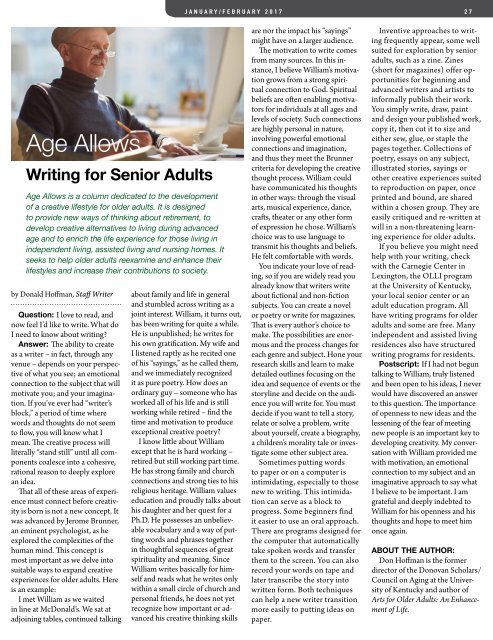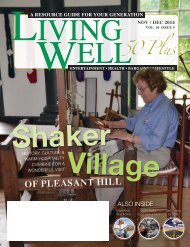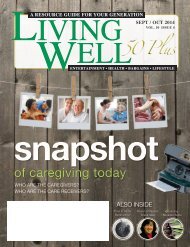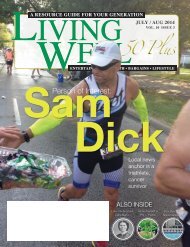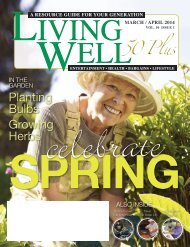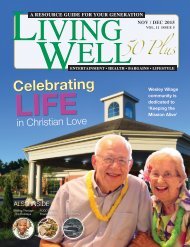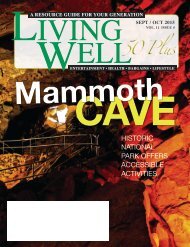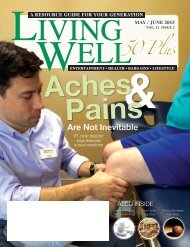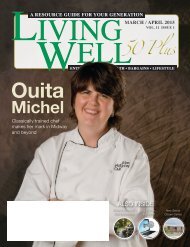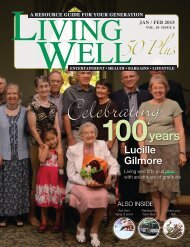Living Well - Jan - Feb 2017
You also want an ePaper? Increase the reach of your titles
YUMPU automatically turns print PDFs into web optimized ePapers that Google loves.
JANUARY/FEBRUARY 2 0 1 7<br />
2 7<br />
Age Allows<br />
Writing for Senior Adults<br />
Age Allows is a column dedicated to the development<br />
of a creative lifestyle for older adults. It is designed<br />
to provide new ways of thinking about retirement, to<br />
develop creative alternatives to living during advanced<br />
age and to enrich the life experience for those living in<br />
independent living, assisted living and nursing homes. It<br />
seeks to help older adults reexamine and enhance their<br />
lifestyles and increase their contributions to society.<br />
by Donald Hoffman, Staff Writer<br />
Question: I love to read, and<br />
now feel I’d like to write. What do<br />
I need to know about writing?<br />
Answer: The ability to create<br />
as a writer – in fact, through any<br />
venue – depends on your perspective<br />
of what you see; an emotional<br />
connection to the subject that will<br />
motivate you; and your imagination.<br />
If you’ve ever had “writer’s<br />
block,” a period of time where<br />
words and thoughts do not seem<br />
to flow, you will know what I<br />
mean. The creative process will<br />
literally “stand still” until all components<br />
coalesce into a cohesive,<br />
rational reason to deeply explore<br />
an idea.<br />
That all of these areas of experience<br />
must connect before creativity<br />
is born is not a new concept. It<br />
was advanced by Jerome Brunner,<br />
an eminent psychologist, as he<br />
explored the complexities of the<br />
human mind. This concept is<br />
most important as we delve into<br />
suitable ways to expand creative<br />
experiences for older adults. Here<br />
is an example:<br />
I met William as we waited<br />
in line at McDonald’s. We sat at<br />
adjoining tables, continued talking<br />
about family and life in general<br />
and stumbled across writing as a<br />
joint interest. William, it turns out,<br />
has been writing for quite a while.<br />
He is unpublished; he writes for<br />
his own gratification. My wife and<br />
I listened raptly as he recited one<br />
of his “sayings,” as he called them,<br />
and we immediately recognized<br />
it as pure poetry. How does an<br />
ordinary guy – someone who has<br />
worked all of his life and is still<br />
working while retired – find the<br />
time and motivation to produce<br />
exceptional creative poetry?<br />
I know little about William<br />
except that he is hard working –<br />
retired but still working part time.<br />
He has strong family and church<br />
connections and strong ties to his<br />
religious heritage. William values<br />
education and proudly talks about<br />
his daughter and her quest for a<br />
Ph.D. He possesses an unbelievable<br />
vocabulary and a way of putting<br />
words and phrases together<br />
in thoughtful sequences of great<br />
spirituality and meaning. Since<br />
William writes basically for himself<br />
and reads what he writes only<br />
within a small circle of church and<br />
personal friends, he does not yet<br />
recognize how important or advanced<br />
his creative thinking skills<br />
are nor the impact his “sayings”<br />
might have on a larger audience.<br />
The motivation to write comes<br />
from many sources. In this instance,<br />
I believe William’s motivation<br />
grows from a strong spiritual<br />
connection to God. Spiritual<br />
beliefs are often enabling motivators<br />
for individuals at all ages and<br />
levels of society. Such connections<br />
are highly personal in nature,<br />
involving powerful emotional<br />
connections and imagination,<br />
and thus they meet the Brunner<br />
criteria for developing the creative<br />
thought process. William could<br />
have communicated his thoughts<br />
in other ways: through the visual<br />
arts, musical experience, dance,<br />
crafts, theater or any other form<br />
of expression he chose. William’s<br />
choice was to use language to<br />
transmit his thoughts and beliefs.<br />
He felt comfortable with words.<br />
You indicate your love of reading,<br />
so if you are widely read you<br />
already know that writers write<br />
about fictional and non-fiction<br />
subjects. You can create a novel<br />
or poetry or write for magazines.<br />
That is every author’s choice to<br />
make. The possibilities are enormous<br />
and the process changes for<br />
each genre and subject. Hone your<br />
research skills and learn to make<br />
detailed outlines focusing on the<br />
idea and sequence of events or the<br />
storyline and decide on the audience<br />
you will write for. You must<br />
decide if you want to tell a story,<br />
relate or solve a problem, write<br />
about yourself, create a biography,<br />
a children’s morality tale or investigate<br />
some other subject area.<br />
Sometimes putting words<br />
to paper or on a computer is<br />
intimidating, especially to those<br />
new to writing. This intimidation<br />
can serve as a block to<br />
progress. Some beginners find<br />
it easier to use an oral approach.<br />
There are programs designed for<br />
the computer that automatically<br />
take spoken words and transfer<br />
them to the screen. You can also<br />
record your words on tape and<br />
later transcribe the story into<br />
written form. Both techniques<br />
can help a new writer transition<br />
more easily to putting ideas on<br />
paper.<br />
Inventive approaches to writing<br />
frequently appear, some well<br />
suited for exploration by senior<br />
adults, such as a zine. Zines<br />
(short for magazines) offer opportunities<br />
for beginning and<br />
advanced writers and artists to<br />
informally publish their work.<br />
You simply write, draw, paint<br />
and design your published work,<br />
copy it, then cut it to size and<br />
either sew, glue, or staple the<br />
pages together. Collections of<br />
poetry, essays on any subject,<br />
illustrated stories, sayings or<br />
other creative experiences suited<br />
to reproduction on paper, once<br />
printed and bound, are shared<br />
within a chosen group. They are<br />
easily critiqued and re-written at<br />
will in a non-threatening learning<br />
experience for older adults.<br />
If you believe you might need<br />
help with your writing, check<br />
with the Carnegie Center in<br />
Lexington, the OLLI program<br />
at the University of Kentucky,<br />
your local senior center or an<br />
adult education program. All<br />
have writing programs for older<br />
adults and some are free. Many<br />
independent and assisted living<br />
residences also have structured<br />
writing programs for residents.<br />
Postscript: If I had not begun<br />
talking to William, truly listened<br />
and been open to his ideas, I never<br />
would have discovered an answer<br />
to this question. The importance<br />
of openness to new ideas and the<br />
lessening of the fear of meeting<br />
new people is an important key to<br />
developing creativity. My conversation<br />
with William provided me<br />
with motivation, an emotional<br />
connection to my subject and an<br />
imaginative approach to say what<br />
I believe to be important. I am<br />
grateful and deeply indebted to<br />
William for his openness and his<br />
thoughts and hope to meet him<br />
once again.<br />
ABOUT THE AUTHOR:<br />
Don Hoffman is the former<br />
director of the Donovan Scholars/<br />
Council on Aging at the University<br />
of Kentucky and author of<br />
Arts for Older Adults: An Enhancement<br />
of Life.


